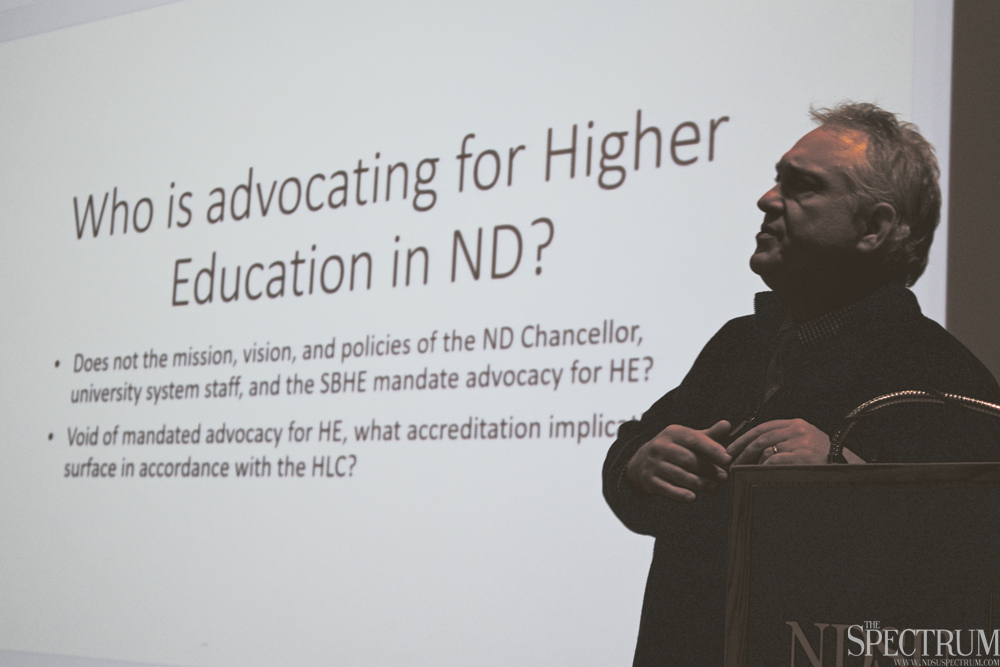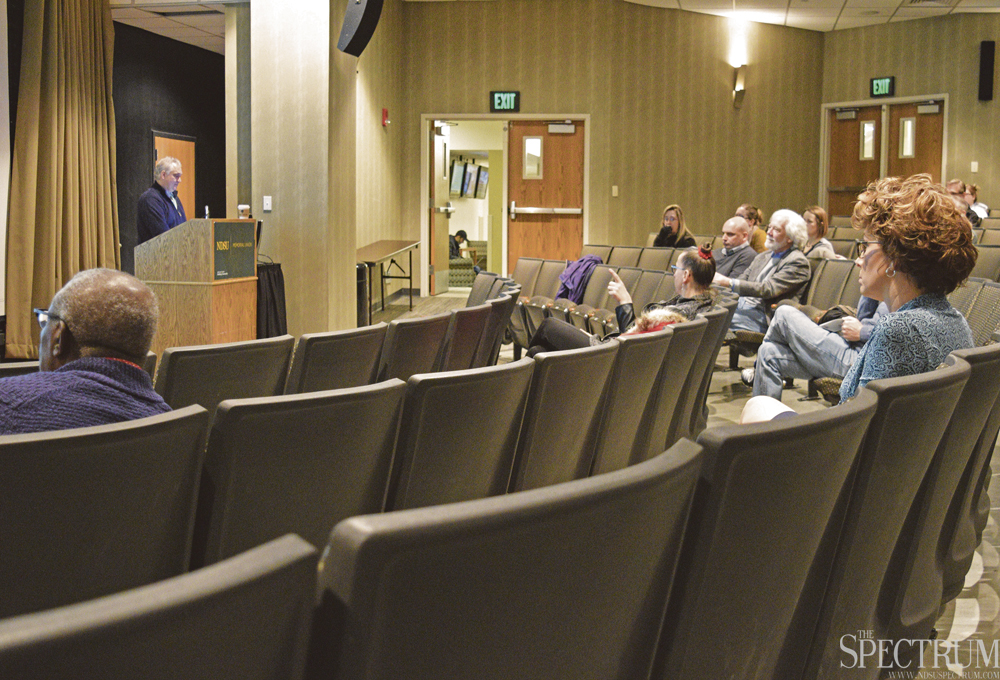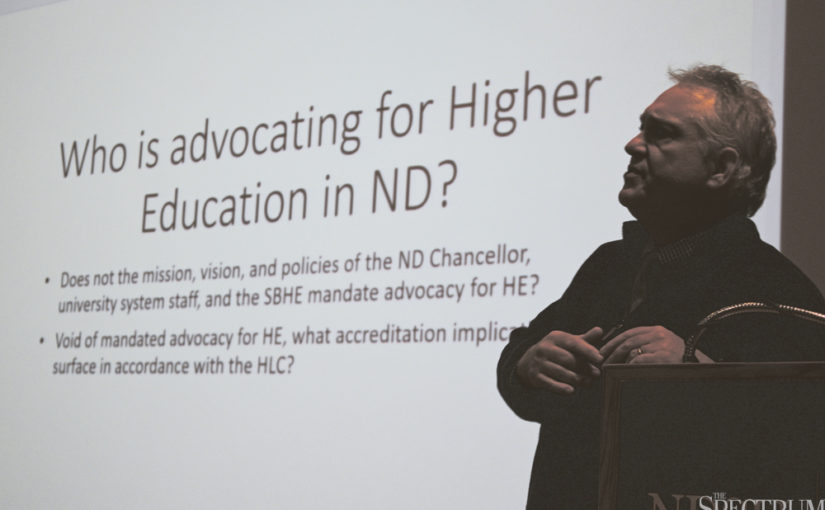
Mark Meister, chair of the communication department, hosted an open faculty forum Thursday at Century Theater.
Faculty members had choice words for Bismarck and their boss’s bosses Thursday afternoon at an open forum in the Century Theater.
For an hour, some of the 25 faculty members in attendance criticized the North Dakota University System, the State Board of Higher Education, state politicians, Chancellor Mark Hagerott and his staff and themselves for a lack of university support.
Regarding media coverage and system policies, Mark Meister, chair of the communication department, said he has noticed “a void. A pretty glaring void. That void is, there doesn’t seem to be any state agency unit that is advocating for higher education in the state of North Dakota — at a particularly important time.”
Meister hosted the forum, putting forth an explicit argument: those who should be advocating for NDUS schools, like North Dakota State, are not doing their jobs.
“And I’m wondering why, and I’m wondering what, as faculty, we can do” about it, Meister said.
‘An orchestrated attack’
State budgets have tightened and been slashed as oil and agricultural commodities dived from record highs earlier this decade. Higher education problems, though, go beyond these cuts, faculty said.
The SBHE and NDUS are changing policies so quickly that NDUS faculty is struggling to keep up, Jane Schuh said. In particular, new tenure and sick leave policies have left NDUS faculty distraught.
“It has been hell since December just to keep people up-to-date on one stupid policy change,” Schuh, a microbiology professor and NDSU representative on the Council of College Faculties, said.
Meister said since 2010, revisions have been churned out at a rapid rate, and for motivated reasons.
“We’re seeing, I think, an orchestrated attack on higher education,” he said. “I believe there is a lack of support by the chancellor and the staff of the North Dakota State Board of Higher Education.
“ … I believe there’s an orchestrated effort to publicly delegitimize higher education and faculty in the state of North Dakota. I believe there’s what I would call strategic ambivalence towards higher education issues to the North Dakota Legislature.”
Meister said he couldn’t find a public statement from the chancellor or SBHE that advocated for NDUS institutions’ causes. That diverges from the NDUS and SBHE mission statements, which state the system offices exist to support the 11 universities and colleges within NDUS. Faculty does not have a voting member on the SBHE, which passes system-wide policies. The CCF exists, albeit feebly.
“I shouldn’t say this, oh, by the way, I’m Dennis Cooley, the immediate past president of the faculty senate,” Dennis Cooley, a philosophy and ethics professor, said. “First, CCF has sucked for decades. They have had absolutely no power.
“ … The other problem is the centralization crap that’s been coming out of NDUS. The chancellor is a Navy guy, which is not a bad thing. But he thinks this should be run the way that he thinks the Navy runs — without the money.”
Centralization of university emails from NDSU’s system to NDUS’s server over spring break caused headaches for students and faculty. Student senate opposed the move, creating a resolution against the merger to no avail. It’s expected that IT will continue to merge completely into the university system, as dictated by North Dakota Century Code. Centralization has driven the new system-wide sick leave policy, too, with which Schuh and the CCF struggled.
“Our charge was to come up with a sick leave policy that could govern all 11 institutions, but what we should have been talking about is why the hell do all 11 institutions need the same damn sick leave policy?” Schuh said.
The latest sick leave model, the fourth version, “at least isn’t hateful.” Schuh said earlier revisions weren’t as nice.
“I told the Chancellor, ‘That third revision — that’s mean. That was just mean.’ And he said, ‘Well I can assure you that there is not a conspiracy against faculty.’ And I thought, ‘Freudian slip there because I didn’t say there was a conspiracy, but it sure looks like one.’”

Jane Schuh, center-right, and other faculty members listen to colleagues decry the problems of higher education in North Dakota. Faculty members also mulled plans of action to implement in the near future.
Parties to blame
All involved should share these multifaceted, systemic failures, Meister said, though he was critical of system leaders.
“Most frightening to me is that there’s been an inappropriate scapegoating of university officials and faculty as a means to deflect system deficiencies,” he said.
Faculty members are easy targets because they are often depicted as lazy, tenured employees of the state, Cooley said.
“When I was testifying at the Legislature, people there think we’re idiots — that we’re whiners. This is what I think is wrong with the Board: They’re very nice people, but they think we’re a business. They can’t understand why we’re complaining about not being fired immediately.”
Meister cautioned against completely blaming legislators.
“It’s easy to perceive being a Republican as being confused with fascism,” he said. “Because political will comes through numbers, and we know that in North Dakota.
“ … I believe (legislators) are (working in Bismarck) for the right reason.”
Schuh expressed frustration toward the chancellor and his staff.
“I think that you give the chancellor too much credit,” she said in response to Cooley’s critique of Hagerott. “I don’t think that he’s running the university system at all. I think that his chief-of-staff (Lisa Feldner) is running the University System.”
Feldner, who is also vice chancellor for information technology at NDUS, “is not a friend of faculty. She doesn’t know what faculty do. She is inappropriate in the instances that I’ve work with her — very inappropriate,” Schuh said.
Feldner, she continued, directs the SBHE on its proceedings.
“They’re taking the information they get from the University System and considering it gospel,” Schuh said.
Besides Kevin Melicher, no voting member on the Board has direct experience in higher education. All voting members but one have business backgrounds.
The chancellor says for upset faculty to “find a different job” if they’ve got a problem, Cooley said. “That’s in line with their vision of a system” calling faculty interchangeable parts.
Faculty also must take some of the blame, Meister said.
“We, as faculty, have sat on our hands,” he said. “It is absolutely, consistently true that faculty have allowed and participated in our own lack of power and structure, and I think we have to stop doing it.”
‘Selling our future’
Verlin Hinsz, a psychology professor who’s been at NDSU for 33 ½ years, said these woes aren’t new.
“There’s a history behind this, if you want to know the history, there’s a lot of details. This has been going on for decades, and the university has risen to its stature in spite of a lot,” he said. “I think it depends on which stakeholder you talk to. From my perspective, the legislature wants a weak State Board. It wants a chancellor that they can put their thumb on. From their perspective, they have exactly what they want.”
Larry Reynolds, a distinguished university professor, said when he started at NDSU 32 years ago, the university was not the research institution it is today.
“We’ve become more than a regional teaching university,” he said. “ … There’s no place that you get training and technology more than a university like this one, a research university. Many studies have corroborated the role of higher education in sustaining and advancing the economy. And here’s a place that thinks it has a bad economy now, so, what do they do, they are cutting our education, which, to me, is selling our future.”
Misconceptions and further funding slashes will hurt NDSU, Reynolds said.
“These cuts are going to take us back 30 years,” he said. “There’s no doubt about it.”
Chilling effect
Finding voices to advocate on behalf of the university at the university level is thorny work.
“This room should be packed,” Cooley said of the sparsely populated theater. Even tenured faculty, he continued, are hunkering down and hoping this will all blow over.
“Never underestimate the ability to rule through the chilling effect,” Meister said. Faculty members who are not tenured are put in a perilous position when they speak out, as is university administration.
“I would say as the faculty of North Dakota State University, or the faculty of the University System, I think we’re well-past time to have a stronger voice — because our presidents are being gagged, absolutely being gagged,” Schuh said. “You didn’t hear one president say anything when they gutted tenure.”
They stayed quiet, she continued, because “the presidents and the provosts can be fired. They’re staff. They can be fired.”
Statement of no confidence
One route faculty senate may choose to pursue is a statement of no confidence against the NDUS leaders, but Meister cautioned this ultimatum.
“Frankly, votes of no confidence are symbolic gestures that are presently seen by administrations, high-level administrators, as badges of honor,” he said. “These are merit badges, in some cases.
“I do think it’s on the table, but I’ve always thought that taking an action of vote of no confidence doesn’t make any sense when I’ve never met any of these people, yet we work with them.”
Meister said he has requested meetings with Chancellor Hagerott, offering to drive out to Bismarck to talk. He hasn’t been successful.
Schuh stressed the importance of having a singular, system-wide opinion.
“We cannot be the only university (against the State Board). We cannot be the only institution, at any time” to voice opposition, she said.
“The Chancellor absolutely hates our guts,” Cooley said, noting his sources from the University of North Dakota won’t be in a position to move forward with a no confidence vote.
Meister stressed he is not advocating for a vote of no confidence without first attaining proper dialogue.
Better advocacy
Noting widespread frustration, Meister said he has worked on getting all 11 institutions in this conversation, both face-to-face and online. He started a closed Facebook group called North Dakota Faculty Advocating for Consistent Transparency and Support.
Little steps, like starting conversations and teaching everyone about what faculty actually does will be important, Meister said.
“That’s a place where we can start, to try to build some bridges,” Schuh said. “Clearly, the State Board of Higher Education is not getting the resources that they need to understand what’s going on in higher education.”
Having policymakers and students spend a day in faculty’s shoes may dispel preconceived notions, too, Meister said. “We don’t have to call a press conference every time we do our job.”
Schuh said advocating for one-on-one conversations to fight ignorance will help, as well.
“It’s all of us little strings pulling in the same direction,” she said.
Looking at policy may not hurt, either, Hinsz said, pointing to the state constitution to remind the SBHE of its role.
“The State Board of Higher Education, and only the State Board of Higher Education, is in the North Dakota Constitution,” he said. “The chancellor, the chancellor’s office, does not exist in the Constitution. The Constitution may be the one protector where we can keep the SBHE and remind them of their constitutionally mandated responsibility.”
Meister said, “If we’re going to advocate for higher education, we are going to need the courage to do it.”
